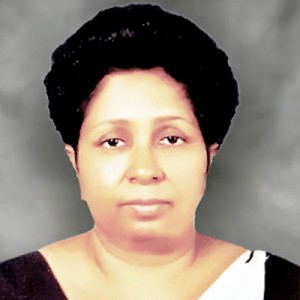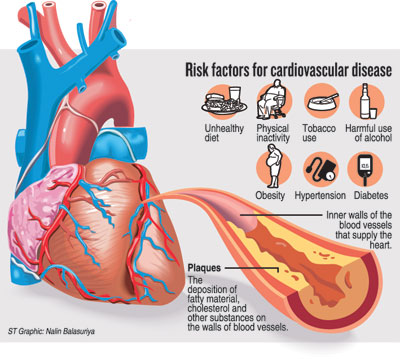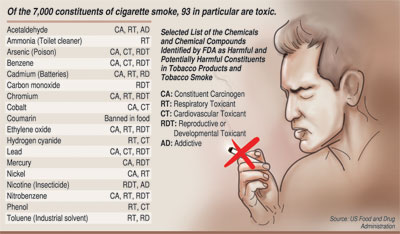News
Simple changes can protect your heart
As World Heart Day was celebrated on Friday, with the aim of cutting premature cardiovascular disease (CVD) by 25% in 2025, Sri Lanka will make a concerted effort to meet this target.

Dr. Nimali Fernando
“CVD is the main cause of death and this is why the World Heart Federation is set on reducing its incidence,” said the President of the Sri Lanka Heart Association (SLHA) and Consultant Cardiologist of the National Hospital of Sri Lanka, Dr. Nimali Fernando, reiterating that 80% of heart disease and stroke are preventable.
The statistics are disturbing:
Each year CVD causes 17.5 million premature deaths globally.
Premature deaths due to CVD are expected to rise to 23 million globally by 2030.
Explaining that premature death for a male means dying before the age of 55 years and for a female before the age of 65 years, Dr. Fernando stresses that there is good news amidst the gloom and doom. For, “simple changes” in lifestyle can improve heart health. They are:
Eating and drinking healthy food and drinks
Exercising
Stopping smoking
This is why the theme of the 2017 World Heart Day is ‘Share how you power your heart’.
“It is important not only to keep your heart healthy, but also share with family, friends and community how they can safeguard their hearts as well,” she says.
On how to look after the heart, Dr. Fernando picks up two important factors that need to be understood — the two types of risks, ‘non-modifiable’ and ‘modifiable’, that we face. Non-modifiable risks include age, gender and inheritance. As a person grows older, the risks of CVD increase. “Family history, meanwhile, comes into play if a ‘first-degree’ relative, such as the father, the mother, a brother or a sister, has developed heart disease prematurely or has suffered a heart attack prematurely and died,” she says.
If a first-degree relative faces such a cardiac event, then others in the family need to be extra careful and get them themselves screened earlier than those who do not have such relatives, even though these are non-modifiable risk factors, the Sunday Times learns.
Urging that the modifiable risk factors – diabetes, hypertension, cholesterol and obesity — should be detected early, she said that by changing these, the total risk can be brought down. After 40 years of age, the recommendation is that every person should get his/her blood sugar, cholesterol and pressure checked once a year.
However, those who have a family history of heart disease should get themselves screened earlier than that.
Dr. Fernando strengthens her arguments with data:
Diabetes causes 60% of all deaths due to CVD.
Hypertension is a silent killer as many people do not know that they are having high blood pressure. This is why regular check-ups once a year after a person reaches 40 years of age are critical.
The Body Mass Index (BMI) should be between 19 and 23.
High cholesterol levels cause 4 million deaths worldwide.
Looking closely at Asian blood vessels, she says that they are smaller and as such prone to plaque getting deposited (atherosclerosis) sooner. This leads to vessels becoming harder and narrower, resulting in blood flow blockages faster. “Therefore, we have to treat our risk factors more aggressively.”
A few changes in your life can protect your heart, adds Dr. Fernando.

| Watch what you eat and feed your children | |
| Startling are the disclosures about obesity. It all starts from infanthood and childhood and what is fed to children, says Dr. Nimali Fernando stressing that the deposition of fat on blood-vessel walls begins from the first decade of life – first 10 years or 0 years to 10 years of age. “Don’t eat and don’t feed your children processed and pre-packed foods which are high in fat and sugar,” is her advice. Cut down on sugary beverages. Choose water or unsweetened fresh fruit juices. Try to eat five portions of vegetables and fruits a day for a diet rich in fruits and vegetables as also fibre and Vitamin K. Even though it may be difficult due to life’s pressures, make an effort to cook the food at home, instead of buying it and avoid fast food. Swap sugar snacks for fresh fruit. Commending the school canteen policy, which she stresses should be implemented in all schools, Dr. Fernando also urges that sponsorship of sports and other school functions by fast food and soft drink companies should be banned, while ensuring that unhealthy food is not sold close to schools. She adds that exercise of moderate intensity, at least 30 minutes five times a week is vital. The whole family could engage in exercises such as walking, playing some game or dancing. Simple measures like taking the stairs instead of the lift, cycling instead of driving help. It would be good to get yourself checked by a doctor, if you are planning to begin exercising. “Schoolchildren should be encouraged to take part in a sport, while offices should be encouraged to have their own gyms with employees being given time to exercise.” Detailing what the SLHA has been doing, she says that interactive clinics are held in the provinces to educate people and also screening sessions conducted in villages with the help of the clergy and leaders. If there is a need, villagers are referred to the nearest hospital. |
| Join heart celebrations on Oct. 15 | |
| A ‘Heart Walk’ and several other events to celebrate World Heart Day will be held by the Sri Lanka Heart Association (SLHA) on October 15. Kicked off from the lawn of the Bandaranaike Memorial International Conference Hall (BMICH) in Colombo 7 at 7 a.m. on October 15 (Sunday), the walkers will wend their way down Bauddhaloka Mawatha–passing the General Cemetery, Borella–Baseline Road IOC Filling Station–Wijerama Mawatha– Horton Place–Bauddhaloka Mawatha—back to the BMICH by 8 a.m. The morning’s events will follow thereafter, with SLHA President Dr. Nimali Fernando and the Chief Guest, popular cricketer Muttiah Muralitharan addressing the gathering. The 3½-hour programme will include a stage drama on the importance of looking after one’s heart; a yoga session by Asanka Liyanage; ‘Share the Power’, a speech by Consultant Cardiologist of the Kandy Teaching Hospital, Dr. Thilak Sirisena; a music interlude; Selection of heart healthy food by Nursing Sister P.E. Rani; a talk on Nutritional Food by Clinical Nutritionist and Senior Lecturer, Faculty of Medicine, University of Colombo, Dr. Ranil Jayawardane; and the Vote of Thanks by Consultant Cardiologist of the Ratnapura Provincial General Hospital, Dr. Sanjeewa Rajapakse. |
| That deadly fag | |
The single “best” action to help heart health is to stop smoking. “Every single cigarette a person smokes causes a problem. Did you know that after two years of quitting smoking, the CVD risk comes down drastically and after 15 years of not smoking that person comes on par with a non-smoker,” says Dr. Nimali Fernando, paying tribute to the government for taking many steps to curb this menace. “We suggest further reductions in the affordability of tobacco products by further increasing tobacco excise rates and also the banning of all forms of tobacco advertising, promotion and sponsorship as schoolchildren in the formative and impressionable ages are vulnerable to get addicted. Parents and teachers should be very vigilant and the curriculum should include lessons on the hazards of smoking,” she says. Even the family will benefit, when the smoker quits as they will not be exposed to second-hand smoke, thus safeguarding their heart health, it is learnt, with smokers now having aids such as chewing gum, certain drugs and protocols to help them quit. Similarly, alcohol addiction should be dealt with aggressively with pictorial warnings on labels being made compulsory, says Dr. Fernando, adding that in this case too schoolchildren are the most vulnerable targets and urgent measures are needed to protect them. Her advice to adults is: “If you feel like having an alcoholic drink, keep it at the recommended level which is 100ml for men and 50ml for women.” Meanwhile, Sri Lanka has been chosen to receive ‘dedicated international support’ through the United Nations to take action to reduce tobacco use. Echoing the serious concerns expressed by the SLHA, the WHO in a statement said that tobacco use causes many life-threatening diseases including cancer and heart and lung diseases and is one of the world’s leading causes of premature death. It also presents a significant barrier to national development, as it causes economic and environmental impacts. Tobacco control will contribute to Sri Lanka’s efforts to achieve the 2030 sustainable development agenda and through the WHO’s ‘Framework Convention on Tobacco Control (FCTC) 2030’ project Sri Lanka will receive assistance to undertake a five-year government-wide programme to strengthen tobacco control. |

